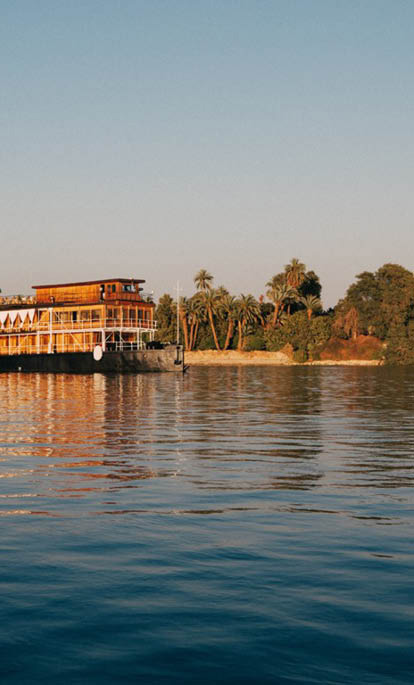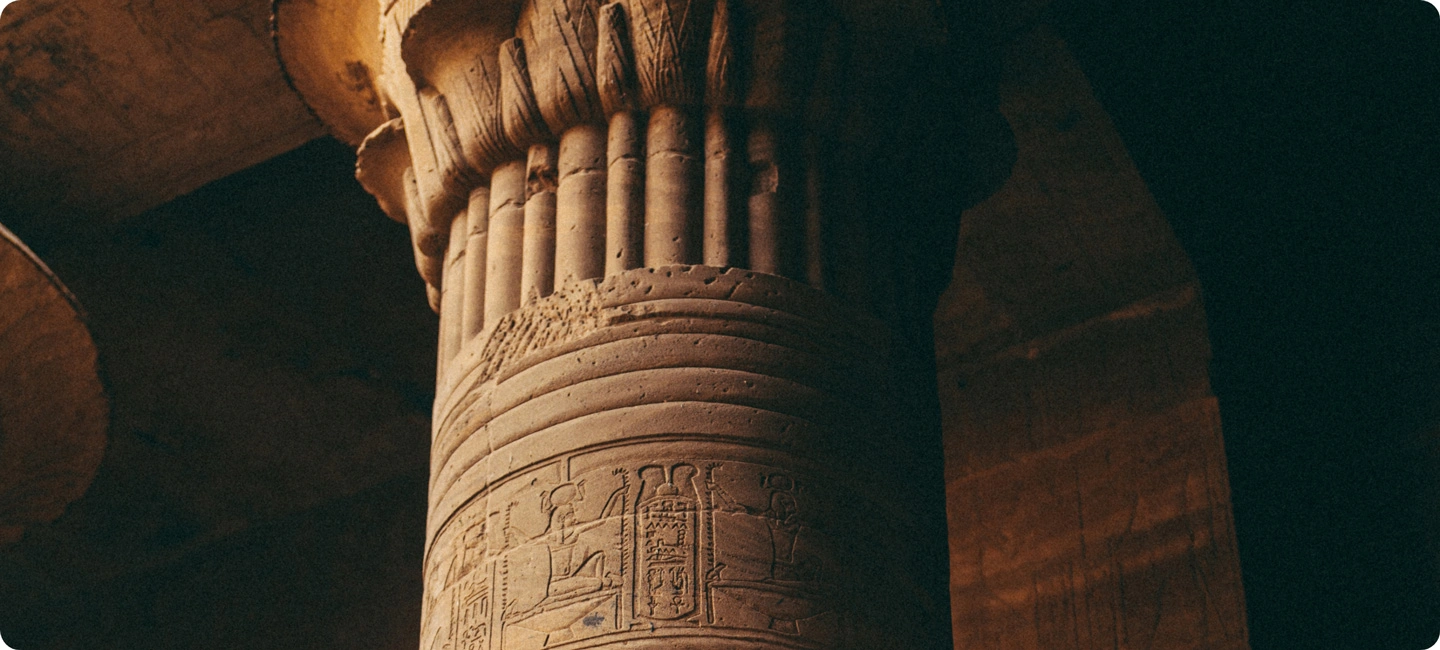
A few suggestions to get the holiday planning process started

When it comes to Egypt’s Nile, we’ve secured full bragging rights with exclusive access to the Steam Ship Sudan, the last of the authentic paddle steamers which also served as inspiration for Agatha Christie. If it’s the lesser-known sites you’re after, we can instead bag you a cabin onboard the Flâneuse du Nil, a traditional dahabieh sailing boat that plies the Nile. We’ve also got the best guides under our belt for exclusive access to the Pyramids, temples and tombs of Egypt, and our handy app is home to an ever-growing list of tried and tested shops, restaurants and more.
ENQUIRE NOWDiscover different ways to explore Egypt
Practical advice and inspiration to help you prepare for your holiday
With a Conde Nast Top Travel Specialist among our consultants and four in-country Concierges, there’s little we don’t know about Egypt. Our expertise has grown over the 15 plus years we have been travelling there and is now second-to-none. With access to the famed Steam Ship Sudan and Flâneuse du Nil, we’re constantly working all-hands-on-deck to craft you the best Nile cruises. Back on land, archaeologists give behind-the-scenes access to the Pyramids, temples and tombs, and local representatives will meet you for transfers, excursions and check-ins for a smooth-sailing trip.

Egypt holidays have all the ingredients to ignite your curiosity. Firstly, the museums are mind blowing. One such institution is Cairo’s Egyptian Museum, displaying the death masks of pharaoh’s past and some 120,000 antiquities, while Tutankhamun’s full burial collection will be displayed in the highly anticipated GEM (Grand Egyptian Museum) in Giza. There’s something special about visiting the Pyramids of Giza and crawling through secret tunnels to get to the great burial chambers. To stand and admire the Great Pyramid of Khufu, a structure which consists of over two million blocks of stone and has stood for more than forty-five centuries - for most of which time it was the world's tallest building - is something special. As the Arab proverb goes: 'Man fears time, but time fears the pyramids’. Exploring the Valley of the Kings, on the Nile's western banks, is another must-visit for its painted royal temples, as is Abu Simbel, a monumental feat of architecture built by Ramses II between 1264 and 1244 BC. On the eastern side of the Nile, you could easily spend a lifetime learning about the colonnaded Karnak complex, especially the papyrus columns of the Great Hypostyle Hall. And where to relax after all that sightseeing? The Red Sea not only offers luxurious resorts complete with tennis courts, kids’ clubs and pampering spas but also superb coral reefs that are home to fantastic marine life over which you can snorkel or dive.
Few destinations work equally well for both couples and families, but Egypt manages more than credibly, combining culture and cracking beaches in one delectable holiday destination. And you don’t have to be a history buff to be impressed by Egypt’s past. Egypt holidays can bring the country’s glorious ancient past to life, whether by exploring temple complexes with an expert guide or marvelling at them from the deck of your luxury Nile steam ship. Channel your inner archaeologist while inspecting hieroglyphics and unlocking ancient treasures preserved in Cairo’s awe-inspiring Egyptian Museum. Diving fanatics should head to the Red Sea’s offshore coral reefs, satisfying even the most seasoned divers with numerous shipwrecks and marine life to rival Australia’s Great Barrier Reef.
Egypt’s landmarks are sprawled across the country, accessible by car, plane and boat, so a seamless itinerary is imperative. In Cairo, a driver and an expert guide (the key ingredient) can take you to around the best bits, from souqs to museums, while you might want to swap your vehicle for a camel ride around the Pyramids of Giza to avoid the main crowds. Small boats make all the difference when taking a cruise along the Nile, allowing you to stop off in places that larger vessels cannot. Hop on and off at ancient temples with plenty of pampering in between. Combine this with a stint in Hurghada by the Red Sea for well-deserved beach time and watersports galore.
Stay in a hotel facing the Pyramids of Giza. If you can drag yourself away from this coveted spot, visit the Cairo Museum and come face-to-face with Tutankahmun’s resplendent gold mask. Or scour the bazaars with a personal shopper for the best jewellery and leatherware. The secret is to have a top guide. Fortunately we have access to some of the best. A skilled guide is essential not just for the depth of knowledge they can share with you, but for their ability to avoid crowds and hassle. One of the best parts of a tailor-made Original Travel holiday is that you'll feel like you're able to unlock invisible doors. Without your guide, you might never touch the real Egypt, the one beneath the skin of everyday life. You might never find the silversmith in the souq who will engrave your name in hieroglyphics on a key-ring. Or have the chance to get your personal travel diary bound in the most beautiful decorative leather book-binding.
Hire out a traditional dahabiya, a sleek wooden sailing boat originally built to carry royalty. This way you and your party can view the temples from an exclusive perspective and stop off at small islands for private dinners.
Located on the border of Libya in Western Egypt, the Siwa desert is where the vast sands meet greenery, creating a magnificent contrast. This urban oasis has long been a haven of beauty, spectacular in its isolation. Explore ancient temples, hot springs and surreal sandscapes as well as authentic Berber traditions.
For fanatical divers, the Red Sea coast offers undoubtedly the best diving within easy reach of Europe. Sharm el Sheikh, at the tip of the Sinai Peninsula, and Hurghada, just across the Gulf of Suez, both have excellent fully equipped dive centres for diving instruction and exploring the beautiful underwater world. Unlike many other places, the coral reefs here are still in good health and harbour almost as many fish species as Australia's Great Barrier Reef, while the numerous wrecks that lie in these warm, shallow waters add extra interest to the diving.
A cruise along the Nile River aboard the iconic Steam Ship Sudan is undoubtedly one of the best ways to experience this ancient nation. Constructed by Thomas Cook in the 20th century, the ship is now owned by our parent company, Voyageurs du Monde, and here at Original Travel we specialise in organising tours aboard the steamer. Follow in the footsteps of Agatha Christie - whose stay onboard inspired her to write the novel ‘Death on the Nile’ - and enjoy the blend of modern comforts and authentic interiors.
Egypt has two main seasons, with the weather during each season also dependent on the region. The south generally has a Saharan-style climate, while the north is more temperate due to Mediterranean influences. May to October marks the warm (summer) season and the mild winter runs from November to April (with temperatures rarely dropping below 10°C). To avoid the scorching summer temperatures (which sometimes exceed 40°C), we would recommend visiting between October and April. Head to our best time to visit Egypt page for more information.

Our team of destination experts will get to know you and your unique requirements for your holiday

We work with you to build an ultra-personalised holiday itinerary with your choice of accommodation, experiences and activities

All of our holidays include little extras designed to make a big difference to your trip, from fast-tracking you through airport check-in and security to our network of local Concierges